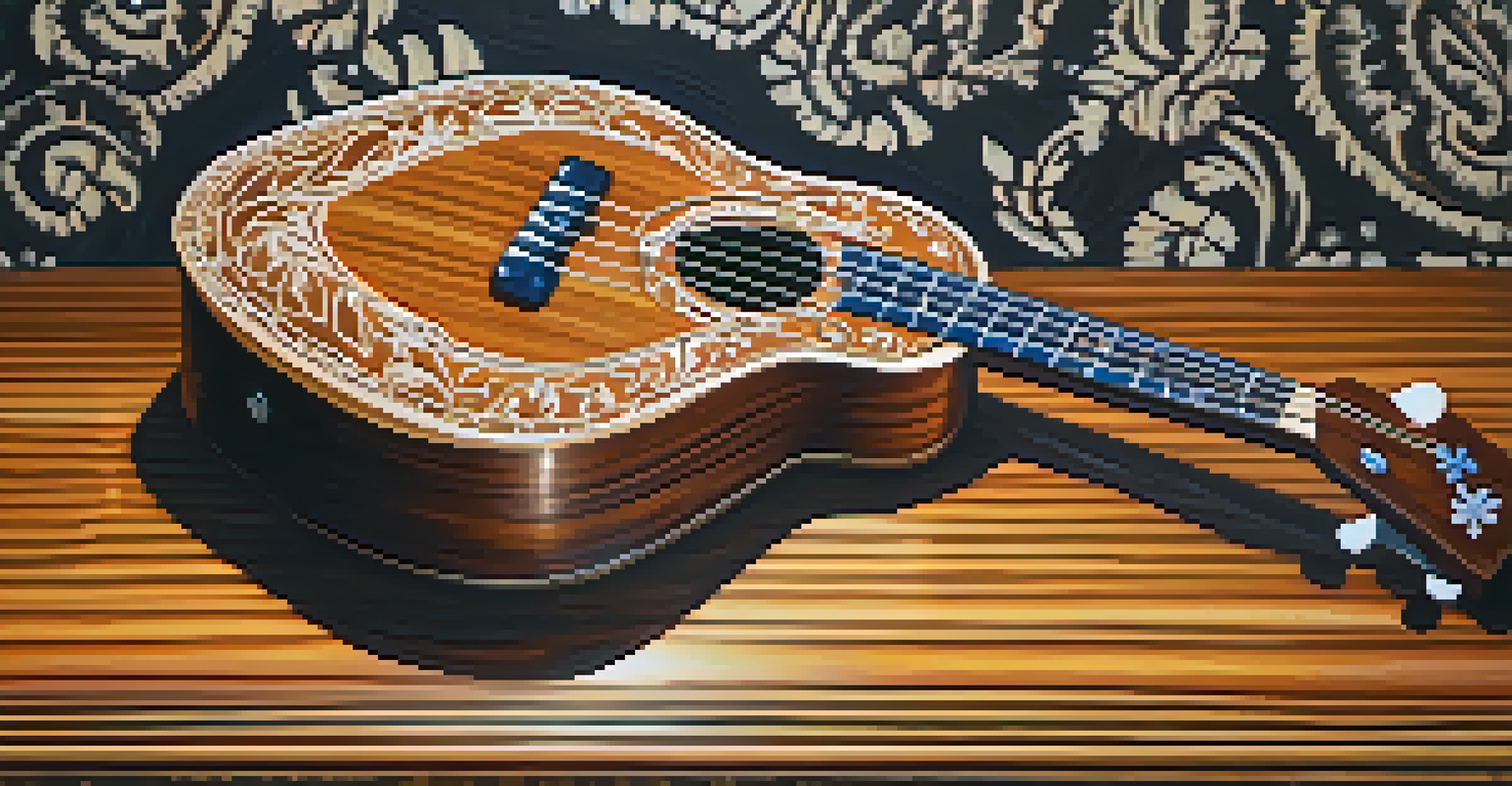The Ukulele's Cultural Roots: A Deep Dive into Hawaiian Heritage

The Origins of the Ukulele: A Hawaiian Perspective
The ukulele, often associated with Hawaii, has roots that trace back to the 19th century. It was adapted from the Portuguese machete, a small guitar-like instrument brought to the islands by immigrants. This blend of cultures marks the beginning of the ukulele's unique identity, as it began to resonate with the local Hawaiian sound.
The ukulele is a very simple instrument, but it has a lot of character and heart, just like the Hawaiian people.
As it evolved, the ukulele became a symbol of Hawaiian culture, embodying the spirit of Aloha. Its cheerful sound and portability made it an ideal companion for gatherings and celebrations, allowing musicians to share stories and traditions. The instrument quickly gained popularity among locals and visitors alike, solidifying its place in Hawaiian music.
Today, the ukulele is not just a musical instrument; it’s a representation of Hawaii’s history and resilience. It reflects the intermingling of different cultures and the importance of community, making it a cherished artifact of Hawaiian heritage.
The Role of the Ukulele in Hawaiian Music
Hawaiian music is deeply intertwined with the ukulele, which has become synonymous with the genre. The instrument's light, airy tones complement traditional Hawaiian melodies, creating a sound that evokes sunny beaches and warm breezes. From hula performances to casual beach jams, the ukulele plays a pivotal role in expressing the island's cultural narratives.

Many famous Hawaiian musicians, such as Israel Kamakawiwoʻole, have elevated the ukulele to international fame, blending contemporary styles with traditional sounds. Their music often reflects themes of love, nature, and community, resonating with audiences far beyond the islands. This fusion not only preserves Hawaiian culture but also introduces it to a global audience.
Ukulele's Cultural Roots in Hawaii
The ukulele, originating from Portuguese immigrants, embodies the spirit of Aloha and has evolved into a symbol of Hawaiian culture.
The ukulele is more than just a tool for entertainment; it is a vessel for storytelling. Each strum tells a tale of the islands, capturing the essence of Hawaiian life and the beauty of its landscapes, thus allowing listeners to connect with the culture on a profound level.
Cultural Significance of the Ukulele in Hawaiian Society
In Hawaiian society, the ukulele holds a special place as a symbol of joy and togetherness. It’s commonly seen at family gatherings, luaus, and festivals, where people come together to celebrate their heritage. The act of playing music fosters connections, making it an essential part of communal life in Hawaii.
The ukulele is a bridge between cultures, a way to share stories and connect with others.
Moreover, the ukulele serves as a bridge between generations. Elders pass down songs and techniques to younger players, ensuring that traditional music remains alive and relevant. This intergenerational sharing not only strengthens familial bonds but also cultivates a sense of identity and pride among the youth.
As a cultural artifact, the ukulele is often featured in educational programs that teach Hawaiian history and traditions. Schools incorporate music into their curricula, using the instrument to engage students while instilling an appreciation for their cultural roots.
The Ukulele's Global Influence and Reach
The ukulele's charm has transcended its Hawaiian origins, captivating audiences worldwide. From the streets of New York to the beaches of Bali, the instrument has found its way into various music genres, including jazz, pop, and folk. This global appeal showcases the versatility of the ukulele and its ability to adapt to different musical styles.
Many music enthusiasts and amateur musicians have embraced the ukulele due to its approachable nature. With just four strings, it is easier to learn than many other string instruments, making it accessible to people of all ages. This has led to a surge in ukulele clubs and online communities, where players share tips, songs, and experiences.
Instrument of Connection and Joy
In Hawaiian society, the ukulele fosters community and intergenerational bonds, making it essential for gatherings and celebrations.
Through its widespread popularity, the ukulele has also become a symbol of cultural exchange. Musicians from diverse backgrounds are blending their styles with the ukulele, creating innovative sounds that pay homage to its Hawaiian roots while incorporating global influences.
Ukulele Festivals: Celebrating Culture and Community
Ukulele festivals have become a vibrant celebration of music and culture, attracting enthusiasts from all over the world. Events like the Honolulu Ukulele Festival showcase local talent and feature workshops, performances, and jam sessions. These gatherings not only highlight the instrument's significance but also foster a sense of community among participants.
At these festivals, attendees have the chance to learn from renowned ukulele players and immerse themselves in Hawaiian culture. Workshops often delve into traditional playing techniques, helping to preserve the music's authenticity. This emphasis on education ensures that the next generation continues to appreciate and play the ukulele.
Moreover, festivals provide a platform for cultural exchange, as musicians from different backgrounds come together to share their love for the ukulele. This blending of styles and traditions enriches the experience, creating a tapestry of sounds that celebrates the instrument's diversity and unifying power.
The Ukulele in Modern Hawaiian Identity
In contemporary Hawaii, the ukulele remains a powerful symbol of identity and pride. It is often featured in local events, parades, and celebrations, reinforcing its status as an emblem of Hawaiian culture. The instrument serves as a reminder of the islands' rich heritage and the resilience of its people.
As Hawaii faces challenges such as tourism and cultural commodification, the ukulele helps maintain a sense of authenticity. Musicians are increasingly using it to advocate for cultural preservation, ensuring that traditional Hawaiian values and practices are respected and honored. This advocacy highlights the importance of the ukulele in celebrating and protecting Hawaiian identity.
Global Influence of the Ukulele
The ukulele's charm has captivated audiences worldwide, blending with various music genres and promoting cultural exchange.
The ukulele’s role in modern Hawaiian identity extends beyond music; it embodies a spirit of community and connection. Whether played at a family gathering or on a global stage, it continues to bring people together, fostering a deeper understanding of Hawaiian culture and its significance in today's world.
Learning to Play the Ukulele: A Cultural Journey
For many, learning to play the ukulele is not just about music; it's a gateway to understanding Hawaiian culture. As individuals pick up the instrument, they often explore traditional songs that reflect the islands' history and values. This process fosters a deeper connection to the culture and encourages appreciation for its nuances.
Ukulele lessons often emphasize the importance of storytelling in Hawaiian music. Instructors teach students not only how to play but also the meanings behind the songs. This holistic approach enriches the learning experience, allowing students to appreciate the cultural context of the music they are playing.

As people share their musical journey, they contribute to the ongoing narrative of the ukulele and its place in Hawaiian heritage. Whether in local music schools or online platforms, aspiring musicians are connecting with each other and the rich history of the ukulele, ensuring that this beloved instrument continues to thrive.